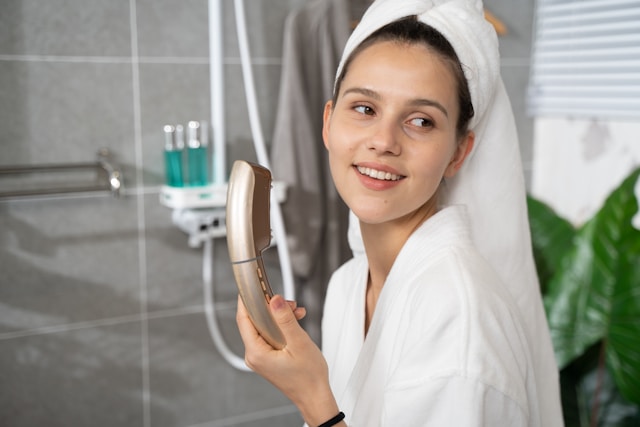5 Skincare Myths Busted: The Truth About Achieving Radiant Skin

It is hard to navigate the various products, trends, and advice in the skincare industry to get healthy, glowing skin. There are many untruths still circulating that influence bad decisions in skin care. False ideas often come through influencers, advertisements, or aged information they can easily mislead a consumer. In this article, five common myths in skincare are struck down, enabling better skin care choices.
Myth 1: Oily Skin Doesn't Need Moisturizer
Most people think that oily-skinned people do not need moisturizer. Moisturising oily skin is too excessive like overproduction tends to make one's skin shadier and gives potential breakout troubles. Even though people have greasy skin that produces oil excessively, they will still need their skin to remain hydrated. Your body might make up for this moisture by overproducing oil in areas that dry up.
The skin would develop even more acne and blocked pores plus it could start oiling out too. Those with oily skin need moisturizing, but their best option is light, oil-free, or gel-based moisturizers that hydrate well. These moisturizers are meant to hydrate your skin and not let it become wet greasy or heavy. Not using moisturizer is a mistaken act because sometimes it takes out the natural moisture of the skin.
This can make your skin produce excessive oil and more problems. Applying a daily moisturizer keeps your skin fresh and healthy, protected from all kinds of external hazards. Therefore, moisturize even when your skin is oily. Simply take that which suits your skin type best.
Myth 2: High-Priced Products Are Always Better
People believe that a skincare product with a higher price tag will be more effective on their skin. Luxury skincare brands and advertisements tend to focus on product superiority, elegant packaging, and expensive ingredients. In a nutshell, the truth is that expensive doesn't necessarily mean better than the cheaper one. The effectiveness of a skincare product depends much more on its active ingredients than its cost or luxury.
Most drugstore products contain what are considered important ingredients, like hyaluronic acid, retinol, and vitamin C, to name a few. Overfilled or fragranced expensive products may be irritating and less effective than those containing active ingredients. When choosing any skincare product, it is advisable to look out for ingredients with proven work effectiveness.
For instance, retinol is considered to help alleviate aging, whereas niacinamide reduces redness and inflammation. As clean beauty and ingredient transparency are becoming more prominent, affordable brands are now prioritizing quality, effective ingredients at reasonable prices. It is important to know what your skin requires and choose the right products, irrespective of brand or price.
Myth 3: You Shouldn't Wear Sunscreen on Cloudy Days or Indoors
One of the most hazardous myths in skin care is that one does not require applying sunscreen on cloudy days or indoors. People always believe that if they cannot see the direct sun, then they will not have the risks of UV rays. But this is a myth that causes your skin to deteriorate over time. The fact is that the sun's rays, specifically UVA, can penetrate clouds and windows.
UVA rays trigger premature aging of the skin, which may manifest as wrinkles, fine lines, and dark spots. This kind of ray damages your skin even on cloudy days or indoors. UVB causes sunburns and is much stronger when the sun shines brightly. Though less likely, it is still possible to suffer harm on cloudy days or indoors by a window.
Moreover, even if you are not sunbathing directly, your skin can be harmed by UV rays. Most of the UV comes from daily activities like getting coffee, driving, or sitting near windows. Use sunscreen daily to block UVA and UVB, even indoors or on cloudy days. Skin doctors recommend the use of an effective sunscreen of at least 30 SPF to be applied daily. While sitting outdoors, after every two hours, reapply that sunscreen also. Putting on protection daily is the first step to combating premature aging, protecting skin, and reducing cancer risks.
Myth 4: Pore Strips Will Permanently Shrink Your Pores
Pore strips are sold as a quick way to get clear skin. They can get rid of dirt, oil, and blackheads from blocked pores. Pore strips quickly remove dirt from your skin but don't permanently shrink or change pore size. The size of your pores is mainly controlled by your genes, how old you are, and your surroundings. No outside product can change this a lot. Using pore strips too much can hurt your skin more than help it.
They might irritate your skin, thereby swelling, and thus making the pores look much bigger than normal. Pore strips remove dirt but don't represent oil, sun damage, or collagen loss that contributes to large pores. For improved pores, follow a skincare routine with gentle washing, exfoliation, and moisturizing. Exfoliating acids, like salicylic acid or glycolic acid, help get rid of dead skin cells and keep your pores clean.
Using a light moisturizer regularly can help keep your skin hydrated and stop your pores from getting blocked. Also, some ingredients like niacinamide can help make large pores look smaller over time. Using pore strips for quick results is effective, but a consistent skincare routine with targeted treatments yields smoother, clearer skin.
Myth 5: Your Skin Is Always Better With Natural Ingredients
Skincare enthusiasts often prefer natural ingredients, viewing them as safer and more beneficial for the skin than synthetic alternatives. Many natural ingredients can indeed be good for you, but they aren't always better or more effective than synthetic ones. Some natural ingredients can irritate the skin or cause allergies, especially for people with sensitive skin.
Certain potent oils, such as lavender or tea tree oil, can cause skin irritation like redness or swelling. Also, some plant-based ingredients might have substances that aren't suitable for all skin types. Artificial ingredients such as hyaluronic acid, peptides, and ceramides have been studied and found beneficial without irritating. These ingredients are usually stronger and more reliable, giving more consistent results.
A skincare product's effectiveness depends on how its ingredients benefit your skin, regardless of whether they are natural or lab-made. Before using a product, review its ingredients, perform a patch test, and assess how effective the ingredients are. A successful skincare routine involves identifying your skin's needs and selecting the appropriate ingredients, regardless of their source.
Conclusion
It’s important to clear up common skincare myths to build a skincare routine that works well for you. It's key to debunk misconceptions, such as the belief that oily skin skips moisturizer and pore strips shrink pores permanently. Choose science-backed products tailored to your skin type for the beautiful skin you desire, avoiding misleading ads and outdated advice.
Remember, taking care of your skin isn’t about buying expensive products or following the latest trends. It’s about being regular in your routine, knowing what your skin needs, and using ingredients that work. By having the right information, you can confidently improve your skincare routine for healthier, brighter skin.








